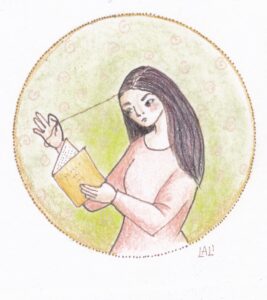“It’s the size of a communion wafer, doctor! I only found it this afternoon,” my mother said as she undid my braids and located the bald spot that had caused her to hail a taxi and rush me to the dermatologist. He took a quick look and said, “Nerves.”
“Nerves? How is that possible? She’s nine years old!” my mother protested.
“Nevertheless, it’s nerves.” And with that, he left the room.
In the metro on the way home, my mother peered at me. “Don’t be nervous,” she said. “There’s nothing to be nervous about.”
I wasn’t sure what “nervous” meant. I had heard my mother and her sisters accuse each other of “having nerves,” which usually meant that they were in a bad mood. And now I too had nerves, and was supposed to get rid of them somehow. It didn’t occur to me that my feelings of dread about school might have something to do with the bald spot. Had this happened fifty years later, I would have been diagnosed with stress and sent to a therapist. As it was, nothing more was said about my nerves, and eventually the hair grew back.
That early bald spot happened all by itself, with no interference on my part. But trichotillomania, or hair-pulling disorder, (from the Greek tricho, hair, and tillo, to pull out), did come into my life years later. I first saw it in my graduate-school roommate, a silent, brilliant, anxious woman studying for a Ph.D. in musicology who was teaching herself Serbo-Croatian to be able to read certain obscure music critics in the original. We, the inhabitants of the female graduate dorm at the University of North Carolina, existed in a perpetual miasma of anxiety, which expressed itself in frequent attacks of weeping alternating with gales of hysterical laughter. My roommate neither wept nor laughed. Instead, she pulled out her hair. As finals approached, she would pull out her eyelashes, then her eyebrows, and when her face was as bald as a hard-boiled egg, she would go to work on the hair on her head, plucking silently and mercilessly until her scalp shone pink through the remaining strands.
You would think that this would have put me off the very idea of hair pulling, but in my thirties I fell prey to trichotillomania myself. I’d be preparing the next day’s lecture, and I would select a single strand of hair from my crown. Back then my hairs were quite thick, sort of like the ones on Shakespeare’s mistress, of which he said, “if hairs be wires, black wires grow on her head.” Certain strands had a bumpy texture, and those were the ones I would seek out. Having found one, I would run it between my index finger and my thumb, feeling its unevenness. Eventually I would switch from using the pad of my finger to my fingernail. And this is where the amazing thing happened: suddenly the overstroked hair would curl up tightly, and break off.
When I finally stood up, the floor around my chair would be littered with hair, and my scalp would be tingling from the pulling. Was I nervous? Was I stressed? I had a husband, two children, and a career, so the answer for most humans in that situation would be an automatic yes. But I didn’t feel stressed while I was trichotillying. I suspect that the tingling of my scalp released some much-needed endorphins into my system.
But I was not alone in my habit, which is shared by many warm-blooded animals. Captive parrots are notorious for engaging in pterotillomania (from the Greek ptero, feather). They do it out of boredom, loneliness, and stress. According to animal researcher Viktor Reinhardt, “hair pulling has been reported in humans, six different non-human primate species, mice, guineapigs, rabbits, sheep and muskox, dogs and cats. This behaviour seems to occur only in subjects who are confined in an artificial environment [italics mine].”
There you have it: parrots in cages, rabbits in hutches, and humans in dorms and classrooms and libraries—all of them unnatural, confining environments leading to stress, not to mention boredom and loneliness. I wonder if my former roommate’s hair grew back after she got her Ph.D. For myself, the habit, which had lasted for decades, disappeared overnight when I retired.



2 Responses
Plenty of twitches, I’m afraid – but not that one.
I used to squirm because clothes – bras, stockings, sweaters – were too tight or too itchy, and it drove my mother nuts, which was probably part of the appeal: I wasn’t comfortable in my (constraining) skin, and you wore certain types of clothing in Mexico City when I was growing up, and that was it.
Now I wear soft pjs all day to write in, and that is good, because I also need 3-5 half-hour or so naps to deal with the ME/CFS, and I’m already dressed for it.
It’s going to be literal hell is I get well and have to go out in society more often.
Remember how people used to dress up to fly in airplanes? Now many wear pajamas, which makes sense, given the perils of air travel these days.